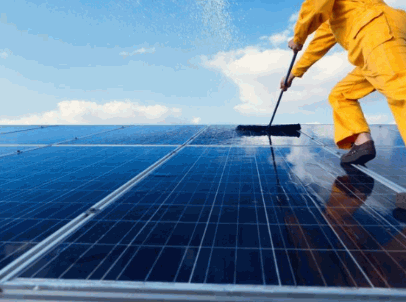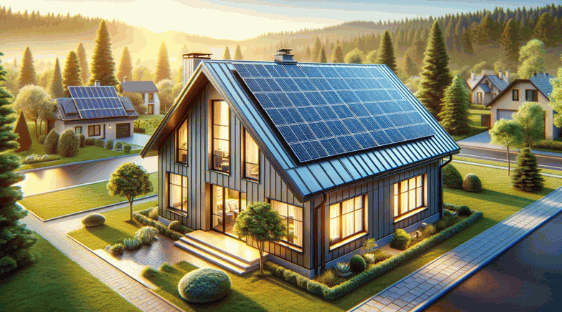
Are you curious about the importance of keeping your solar panels clean? Wondering how dirt affects their efficiency or what risks come with neglecting their maintenance?
In this article, we will explore the benefits of regularly cleaning solar panels, the best ways to clean them, and how often you should do so.
From using a soft cloth and water to avoiding abrasive materials, we've got you covered on dos and don'ts.
Stay tuned to discover how clean panels can maximize energy production and save you money on electricity bills!
Explore: What Does Solar Panels Do For Your Home
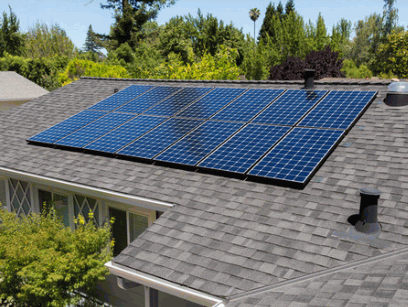
Table of Contents
Regular cleaning of solar panels is crucial to maintain their efficiency and performance. Dust, dirt, and other debris can accumulate on the panels over time, reducing their energy production potential. Factors such as soiling losses, local weather conditions, and site-specific factors like nearby trees or foliage can impact the cleanliness of solar panels.
When solar panels are covered in grime, it creates a barrier between the sun's rays and the photovoltaic cells, preventing optimal energy conversion. This buildup not only hampers performance but can also lead to permanent damage if left unaddressed.
Cleaning methods vary from manual methods like using water and a squeegee to automated systems that require less human intervention. Regular maintenance based on the prevailing weather conditions and site surroundings is essential to prevent excessive soiling losses and ensure maximum efficiency improvements over time.
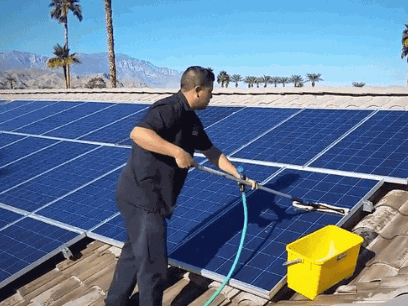
Dirt accumulation on solar panels can significantly impact their efficiency. The presence of dirt, dust, or other debris creates a barrier between sunlight and the solar cells, reducing the panel's ability to generate electricity efficiently. This obstruction not only hampers the absorption of sunlight but also hinders the transfer of energy within the solar panel system. Over time, if not cleaned regularly, this layer of dirt can lead to a decrease in the overall efficiency of the solar panels, resulting in suboptimal energy production. Therefore, regular cleaning and maintenance are crucial to ensuring that solar panels operate at their maximum potential.
When dirt accumulates on the surface of solar panels, it not only affects the energy conversion process but also increases the chances of performance degradation. The dirt layer acts as a shield, preventing sunlight from reaching the photovoltaic cells effectively, which results in a drop in energy output. This loss of energy translates into decreased electricity generation, leading to financial losses and a reduced environmental impact. By implementing proper cleaning methods, such as using mild detergents and soft brushes, solar panel owners can mitigate the negative effects of dirt accumulation and maintain the efficiency of their energy systems.
Neglecting the cleaning of solar panels poses several risks to their efficiency and performance. Accumulated dirt and debris can lead to decreased energy production, potentially resulting in lower electricity output and reduced overall system efficiency.
Regular cleaning is crucial to ensure maximum sunlight absorption, as dirt and grime create a barrier that hinders the panels' ability to convert sunlight into electricity efficiently.
Not maintaining the panels can lead to hot spots forming, which in turn can affect the integrity of the system and shorten its lifespan.
The accumulation of debris may exacerbate wear and tear on the panels over time, necessitating costly repairs or replacements.
The frequency of cleaning solar panels depends on various factors such as soiling losses, local weather conditions, and the presence of dirt or dust in the area. Generally, it is recommended to clean solar panels at least once or twice a year to ensure optimal performance.
Factors like the amount of rainfall, air quality, and proximity to dusty roads can influence how quickly solar panels accumulate dirt and debris. For regions with heavy pollution or high levels of dust, more frequent cleaning may be necessary to prevent significant energy output reductions due to soiling losses.
It is important to monitor the performance of your solar panels regularly to gauge if they are underperforming due to dirt accumulation. Consider the angle of the panels and how much sunlight they receive daily when determining the cleaning frequency. In areas with lower dirt levels and regular rainfall, annual cleaning may be sufficient.
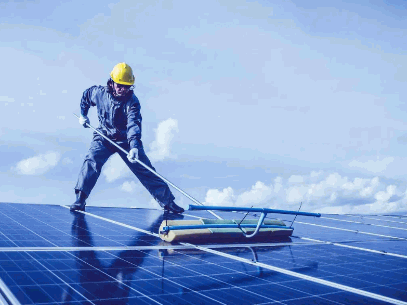
There are several effective methods to clean solar panels, including manual cleaning with soft brushes and water, professional cleaning services, automated cleaning systems, and using specific tools for maintenance. Safety precautions should be observed, and a reliable water supply is essential for thorough cleaning.
In terms of manual cleaning, using soft brushes and a gentle stream of water can help remove dust, dirt, and other debris that accumulate on the panels over time. This method requires careful handling to avoid damaging the panels.
Professional cleaning services offer a convenient option for those who prefer to have experts take care of the maintenance. These services often use advanced equipment and cleaning solutions tailored to solar panels.
Automated cleaning systems are another efficient way to keep panels clean, utilizing programmed schedules or sensors to automatically remove dirt. Investing in the right tools, such as squeegees and non-abrasive cleaners, is crucial for ensuring the longevity and efficiency of solar panels.
Cleaning solar panels using a soft cloth or brush and water is a gentle yet effective method to remove dirt and residue from the panel surfaces. Ensure that the cloth or brush is non-abrasive to prevent scratching the panels.
To manually clean solar panels, start by preparing a mixture of mild soap and water in a bucket. Dip the soft brush or cloth into the soapy water, ensuring it's not too wet to prevent water seepage into the panel edges. Gently scrub the panel surface in circular motions, paying special attention to areas with stubborn residues. Rinse the panels thoroughly with clean water to remove any soap residue. Allow the panels to air dry or gently wipe them with a soft, clean cloth.
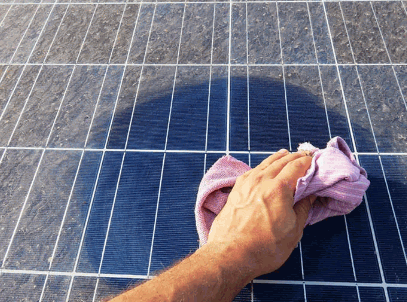
Cleaning solar panels with a hose and water is a convenient method to rinse off dirt and debris. The gentle pressure of the water stream helps dislodge residue without the need for abrasive scrubbing.
When using a hose to clean solar panels, it's important to ensure a steady, even flow of water for optimal results. Avoid using high-pressure settings that could potentially damage the panels or create splatter that leaves streaks on the surface. Instead, opt for a gentle flow that covers the entire panel evenly.
By maintaining a consistent water flow and following a systematic cleaning pattern, you can effectively remove stubborn residues and keep your solar panels functioning efficiently.
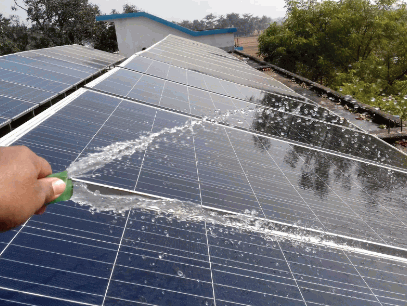
Using a pressure washer can be an efficient way to clean solar panels, especially for stubborn dirt or grime. Caution must be taken to adjust the pressure settings and distance to prevent damage to the panels.
When utilizing a pressure washer for cleaning solar panels, it's crucial to strike the right balance between power and gentleness. Excessive pressure can lead to cracks or scratches on the sensitive surface of the panels.
Maintaining a consistent distance of around 1-2 feet between the nozzle and the panels is essential to prevent direct impact and possible harm.
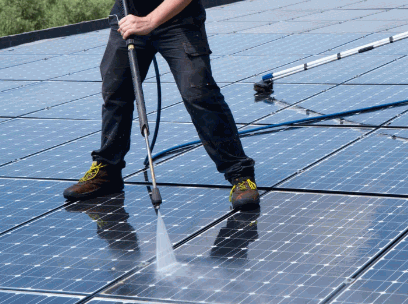
A solar panel cleaning kit typically includes specialized tools, soft brushes, and sometimes cleaning agents to ensure thorough and safe cleaning. These kits are designed to simplify the cleaning process and maintain the panel's efficiency.
When using a solar panel cleaning kit, it is essential to follow the manufacturer's instructions for proper usage of the tools and chemicals provided. The soft brushes are gentle on the panel's surface, ensuring that no scratches or damage occur during cleaning. Cleaning agents help to remove dirt, dust, bird droppings, and other residues that could reduce the panel's performance. By regularly cleaning your solar panels with these kits, you can optimize their energy output and prolong their lifespan.
When cleaning solar panels, it is essential to follow certain dos and don'ts to ensure effective maintenance and prevent damage.
One crucial aspect to consider is choosing the appropriate time of day for cleaning. Early morning or late evening is ideal as the cooler temperatures prevent the soap from drying too quickly, ensuring thorough cleaning without streaks. Opting for mild soap or detergent specifically designed for solar panels can help avoid residue buildup and damage to the panels. It is also recommended to periodically hire professional maintenance services to conduct thorough inspections and cleanings for optimal performance and longevity.
Cleaning solar panels in the morning or evening is recommended to avoid direct sunlight and ensure optimal cleaning conditions. Lower temperatures and indirect light can prevent water spots and improve cleaning efficiency.
When cleaning solar panels during these times, the milder temperatures reduce the risk of thermal shock, which can occur when cold water contacts hot panels in direct sunlight, potentially leading to damage. Cleaning in the morning or evening reduces the chance of injury due to reduced glare and harsh light.
Regular maintenance not only enhances the lifespan of solar panels but also ensures they operate at peak efficiency, maximizing energy production and cost savings for the owner.
Avoid using abrasive materials like harsh brushes or scrubbers when cleaning solar panels, as they can scratch the surface and damage the panel's protective coating. Gentle cleaning tools are recommended to maintain the panel's integrity.
For instance, using microfiber cloths or squeegees can effectively remove dirt and debris without causing any harm to the panels. Water-fed poles with soft brushes are another gentle option for reaching higher solar arrays while ensuring a safe cleaning process. It is crucial to remember that the primary goal is to clean the panels without compromising their efficiency or longevity. By opting for softer cleaning tools, you reduce the risk of voiding warranties or incurring additional maintenance costs due to unnecessary damage.
When cleaning solar panels located on rooftops or elevated areas, using a secure ladder or hiring a professional cleaning service is recommended to ensure safety and thorough maintenance. Proper equipment and training are essential for elevated panel cleaning.
Climbing on rooftops can be hazardous without the right precautions in place. An unsecured ladder or lack of experience can lead to accidents. That's why it's crucial to either use a sturdy ladder with anti-slip feet and proper height or enlist the expertise of professionals who have the necessary skills and tools.
Before hiring a service, always check for their certification, insurance, and reviews to ensure reliability. It's also wise to discuss the safety measures they employ during rooftop cleaning. Remember, safety should be the top priority when dealing with elevated solar panels.
Avoid using soap or detergents for cleaning solar panels, as these substances can leave a residue that hinders sunlight absorption and affects panel performance. Water and gentle cleaning tools are sufficient for effective maintenance.
When soap or detergents are used, they can create a film of residue on the solar panels, which not only blocks sunlight from reaching the photovoltaic cells but also decreases the efficiency of the panels. This residue buildup can accumulate over time, reducing the energy output of the panels and leading to a decrease in overall performance.
By opting for alternative cleaning methods that do not involve harsh chemicals, such as using a solution of water and vinegar or a specialized solar panel cleaning solution, you can effectively remove dirt and grime without leaving behind any residue that can impact solar panel function.
Regularly cleaning solar panels offers numerous benefits, including maximizing energy production, extending the lifespan of the panels, saving money on electricity bills, and reducing the need for frequent repairs and maintenance.
By ensuring that your solar panels are free from dirt, dust, and debris, you can optimize their efficiency and allow them to soak up more sunlight, translating into increased energy output. This not only benefits the environment by utilizing renewable energy sources effectively but also results in substantial cost savings on your monthly electricity bills. A clean surface reduces the likelihood of damage, thereby extending the overall lifespan of your solar panels and minimizing the need for expensive repairs and maintenance. Keeping your solar panels clean is a simple yet effective way to enhance their performance and longevity.
Regular cleaning of solar panels maximizes energy production by ensuring optimal sunlight absorption and reducing energy losses due to dirt or debris accumulation. Clean panels operate at peak efficiency levels, translating into higher electricity output.
Well-maintained solar panels are crucial in harnessing the full potential of the sun's energy. When dust and grime settle on the panel surface, they act as barriers, hindering sunlight from penetrating effectively. This blockage leads to a decrease in energy conversion rates, diminishing the overall output of the system. By regularly cleaning the panels, be it through manual methods or automated cleaning systems, you enable the panels to absorb more sunlight, thus increasing energy generation.
Regular cleaning extends the lifespan of solar panels by preventing long-term damage and degradation caused by dirt buildup. Well-maintained panels are more durable and can operate efficiently for a longer period, ensuring a reliable renewable energy source.
Cleaning solar panels regularly is not just a matter of aesthetics; it directly impacts their functionality and longevity. When dirt, grime, or dust accumulate on the surface of the panels, they create a barrier that reduces the amount of sunlight reaching the solar cells, thereby decreasing their efficiency. By maintaining a clean surface, you allow the panels to capture maximum sunlight, optimizing their performance and energy output.
A dirty panel can heat up unevenly, leading to potential hotspots that can damage the cells over time. Continuous exposure to such heat differentials can accelerate wear and tear, shortening the lifespan of the panels. On the other hand, regular cleaning helps in regulating the temperature distribution, preventing such localized stress points.
Clean solar panels lead to cost savings on electricity bills by optimizing energy production and efficiency. Efficient panels generate more electricity, reducing reliance on grid power and lowering overall energy costs for solar panel owners.
The enhanced performance of clean solar panels translates into significantly decreased monthly expenses for homeowners. By harnessing the maximum potential of solar energy, households can see a substantial decrease in their electricity bills over time.
The improved energy efficiency not only benefits the environment but also provides long-term financial advantages, reducing the reliance on conventional energy sources and their associated costs.
Regular cleaning of solar panels reduces the frequency of repairs and maintenance tasks by preventing issues related to dirt accumulation and efficiency losses. Clean panels are less prone to malfunctions or damage, leading to fewer repair requirements and overall maintenance costs.
When dirt and debris are left to build upon solar panels, it can hinder the absorption of sunlight. This accumulation not only impacts the efficiency of the panels but can also create hot spots that may damage the cells over time. By maintaining a clean surface, you can optimize the performance of your solar system and extend its lifespan without incurring unnecessary expenses for repairs and replacements.
